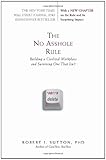But in my own experience, I've worked at one specific place that was very very good about identifying people who plainly didn't help and letting them go. It helped immensely over time: the culture was really good (people were really invested in their job, and loved working as a team) and the retention rate was about 6x higher than most places in the same field.
They didn't use bogus metrics or anything, it was always a "feeling" kind of thing. If several people said someone was not helping, they were most likely right. It was arbitrary I admit, but rarely wrong.
There's books about it (e.g. https://www.amazon.com/Asshole-Rule-Civilized-Workplace-Surv...) but personally haven't read them yet.
I didn't know about Sutton's book at the time, but we used the same rule when raising our seed round. We rejected more than one VC firm based on this rule.
It looks like until Japanese men and women – but especially men – learn to behave themselves on trains in mixed company, completely gender-segregated cars might sadly be the safest way to ride.
I leafed through a book once (and fully intend to actually buy and read though the thing soon) called the "No Asshole Rule". [1] My takeaway was that there are people who on the surface are extraordinarily productive but who are so destructive in interpersonal relations as to contribute negative value overall to a business.
Reading this article makes me wonder if, on a more general level, anybody's tried to quantify the amount assholes cost society in general. And how much of that cost is truly wasted vs. that which creates industry of benefit to all of us. I know effort's gone into using our understanding of psychology to steer people into more responsible social behaviors, but I wonder if all things considered we somehow end up in a better place because assholes are constantly testing limits and we come up with social accommodations for that behavior.
1: http://www.amazon.com/The-Asshole-Rule-Civilized-Workplace/d...


https://www.amazon.com/Asshole-Rule-Civilized-Workplace-Surv...
People don't compartmentalize anywhere near as well as some of the assumptions in this thread, and someone who is an asshole in private is going to be an asshole on the job. The "if it doesn't affect him doing his job" comments are either naive or completely disingenuous.